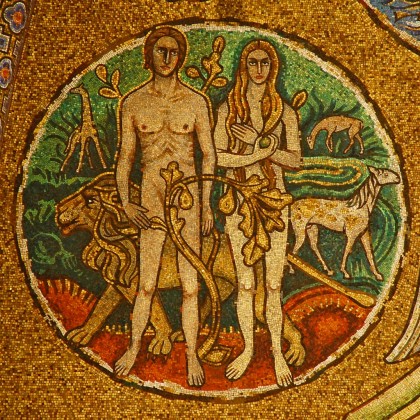The Chief Rabbi on Marriage, Part Two
Devra Torres | Mar 11, 2013 | 8 cmts

The Chief Rabbi of France has written an original and perceptive essay called “Homosexual Marriage, Parenting, and Adoption.” Last week, I made an ambitious attempt to compress his main points into this post, and this week (undaunted, for some reason) I propose to address the way he delves into our experience of sexual complementarity, drawing out what it reveals about (no kidding!) our limitedness, transcendence, interpersonal communion, the bonds between man, woman and child, self-discovery through knowledge of the other, and the spuriousness of self-sufficiency.

I’ll do my best. But the wise reader will go straight to the original article, and he won’t be sorry, either.
* * * * *
Many of us are initially tongue-tied when called upon to defend the intuitively obvious—like “opposite-sex marriage” (or, as Katie suggests, “natural marriage”).
Eventually, though, we will probably manage to hit upon the argument from complementarity.

Here’s something unique to marriage, something same-sex unions can’t replicate. That men and women complement each other biologically is indisputable, and once you’re married and have children, it becomes more and more undeniable that it’s true psychologically and practically as well.

(The idea of a whole new anthropology in which sexual difference is merely a social construction does seem perfectly plausible to young, single college students,

but I think that’s largely due to inexperience—they haven’t lived, for better or for worse, with somebody of the opposite sex, and they haven’t raised kids.)

Sexual complementarity, besides being unique to marriage, is beneficial to children. It’s one thing for a child to be deprived of father, mother or both by divorce or death. It’s quite another to arrange that deprivation, heedlessly mixing and matching donors, gametes, wombs, embryos, surrogates and stepparents.

The data about the effects on children is beginning to come in (see here, here, and here), and it’s not encouraging.
So it seems clear that complementarity is one good thing that “same-sex marriage” can’t provide.
Chief Rabbi Bernheim zeroes in on complementarity, too, but he takes a far deeper look at it—starting from our experience of the “primordial given” of sexual difference.
As he notes:
The polarity of masculine–feminine…is part of the anthropological constitution of humanity.
And what does it tell us? Much more than you might think.
- About our limits:
…[E]very person is brought sooner or later to recognize that he possesses only one of the two fundamental versions of humanity and that the other will remain forever inaccessible….I am not the whole of humanity. A sexed being is not the totality of the species; it needs a being of the other sex to produce its likeness.
- That we’re incomplete, but not alone:

Because of his sexual identity, each person is referred beyond himself. From the moment a person becomes conscious of his sexual identity, he is thus confronted with a kind of transcendence. The person is required to think beyond himself and to acknowledge the independent existence of an inaccessible other—that is, of one who is essentially related to himself and desirable yet never wholly comprehensible.
- Not only does our experience of this polarity direct us outward towards other human persons; it hints at the One who transcends us all:

The experience of sexual difference thus becomes the model for all experiences of transcendence; it designates an indissoluble relation with an absolutely inaccessible reality. On this basis we can understand why the Bible so readily uses the relation between man and woman as a metaphor for the relation between G-d and man: not because G-d is masculine and man is feminine but because it is man’s sexual duality that most clearly manifests an unsurpassable otherness within the closest relation.
(Of course, speaking of God as an “absolutely inaccessible reality” is problematic if you believe He has become incarnate, and might even fail to do justice to the Holy One of Israel descending and speaking to Moses “as a man speaks to his friend,” and “espousing” Israel, as in the Prophet Hosea.

But the point is clear.)
Rabbi Bernheim continues:
Sexual difference must therefore be understood as a fact of nature infused with spiritual intentions.
In other words, this polarity doesn’t just happen to tell us all these things: it’s given to us so that we might understand them.
- It also reveals the communion of persons, binding the family together:
It is because man and woman perceive themselves as different in their sexed being, while they are both equally persons, that there can be complementarity and communion. “Masculine” and “feminine,” “male” and “female,” are relational terms. Masculine is masculine only insofar as it is oriented toward the feminine—and, through the feminine, toward the child….The feminine is feminine only as oriented toward the masculine; and, through the man, toward the child...

- It shows us the limits of knowledge and the fraudulence of self-sufficiency:

The second account of creation deepens this teaching by presenting the act of creation of the woman in the form of a surgical operation by which G-d extracts the one who will become Adam’s companion from what is most intimate to him. Henceforth, neither man nor woman will make up the whole of humanity, and neither one will know all that is human. This expresses a double finitude: I am not everything; I am not even all that is human; and I do not know all that is human: The other sex always remains partly unknowable to me. This double finitude implies that self-sufficiency

is impossible for a human being.
And yet (here's where he starts sounding reminiscent of Bl. John Paul II):
This limitation is not a privation but a gift that allows for the discovery of the love that springs from wonder in the face of difference.
- Sexual difference provides for self-knowledge through knowledge of the other:
Through desire man discovers sexual difference at the heart of nature. “This is now bone of my bones, and flesh of my flesh.” Openness to this other leads to self-discovery as complementary difference: “She shall be called Woman, because she was taken out of Man.”
- From one flesh to the One God:
“Therefore shall a man leave his father and his mother, and shall cleave unto his wife: and they shall be one flesh.” In Hebrew, “one flesh” refers to “the One,” Ehad—the divine name par excellence, according to the Shema: “Hear, O Israel: the Lord is G-d, the Lord is one.”

It is in this union, which is at once carnal and spiritual, a union made possible by difference and by complementary sexual orientation, that man and woman reproduce, in the created order, the image of the One G-d.”
* * * * *
Sexual complementarity, then, is something of which we all have direct, indisputable knowledge. Some reject the evidence of their own lived experience because of their prior ideological commitment to the abolition of masculine and feminine as givens. As Bernheim explains:
Since these theorists presume that sexual difference is the enduring cause of the submission of the woman to the man, equality necessarily implies the end of sexual difference.
But why should their unwillingness to accept the evidence place the burden of proof on those who do accept it? Why should proponents of the obvious be on the defensive?

Comments (8)
Sam Roeble
Mar 12, 2013 9:22am
'Asymmetrical Reciprocity' is another way to say 'sexual difference'.
Angelo Cardinal Scola invented the term. More info...
Devra Torres
Mar 12, 2013 10:26am
Yes, that works well--although I wish I had thought of it yesterday when I was searching for synonyms! I think a lot of people find the idea that sexual identity is 100% constructed plausible because the only alternative they can see is oppression of women based on stereotypes. It's a failure of imagination as much as anything to say (usually implicitly), "Difference is at the root of oppression; therefore, we must deny difference."
Sam Roeble
Mar 12, 2013 12:54pm
Devra Torres, Mar. 12 at 10:26am
It's a failure of imagination as much as anything to say (usually implicitly), "Difference is at the root of oppression; therefore, we must deny difference."
Either a 'failure of imagination' or 'misguided imagination', since the outcome of denying sexual difference is androgyny.
I heard a priest say once, in error I believe, that "in heaven, we will be like the angels--neither male nor female: androgynous".
Now, if grace builds on nature, and our nature as human beings is either man or woman--then grace would not negate our nature but enhance it. That is to say, I will be more of a man in heaven than on earth. To imagine myself to be anything else would be 'failure of imagination'.
Devra Torres
Mar 12, 2013 1:01pm
That's certainly true: it does take imagination to think of androgyny as some kind of ideal! I guess I meant it's a failure of imagination to be unable to reconcile men and women being non-identical (or "asymetrical") with our being equal in dignity.
When those who deny the resurrection tried to trip Jesus up by telling the story of the women who was married seven times, He did tell them that in Heaven, we'll be like the angels, with no marriage or giving in marriage. But that's not to say we'll be androgynous.
Sam Roeble
Mar 12, 2013 2:59pm
Yeah. Another easily misinterpreted passage comes from Galations, "In Christ there is neither male nor female"-- in my interpretation-- meaning, the degree to which the saints reflect Christ is not limited to their sex, i.e. Mary the mother of God is no less like Christ than St. Paul (if not moreso), etc.
But, Mary is still THE Woman for all eternity--unsurpassed in dignity, except by God himself.
There is no marriage in heaven, because--in my interpretation-- the union and beatific vision the saints enjoy there cannot be exclusively expressed as in the pairing off of man and wife. It is an eternal, and all-inclusive event for those invited to it.
Devra Torres
Mar 12, 2013 3:53pm
Yes, and St. Paul continues "for all are one in Christ"--not that difference is abolished, but the Christian idea, on which human rights rest, that no human being's dignity depends on being male or female, being born here or there, of this or that family, under this or that set of social or economic conditions.
Helvi Moore
Mar 13, 2013 5:08pm
It is an interesting fact that in many same-sex relationships a mock complementarity is often played out, with one person assuming a more feminine role and behaviour, and the other, a more masculine one. This is the case in both female and male same-sex "couples";so much so, that there are well-known slang expressions for these roles. It would seem that despite their protestations to the contrary, there is a clear desire for another who is not the same, even in homosexual persons.
Devra Torres
Mar 13, 2013 5:59pm
Yes, the ideology Bernheim talks about is not exactly androgyny--there's still "masculinity" and "femininity" as well as other "genders," but they're strangely fluid and seem to be a matter of choice instead of, or besides, being "givens"--so there's no "privileging" of one or the other, and they can be combined in all kinds of bizarre ways. But the aspect of complementarity persists.